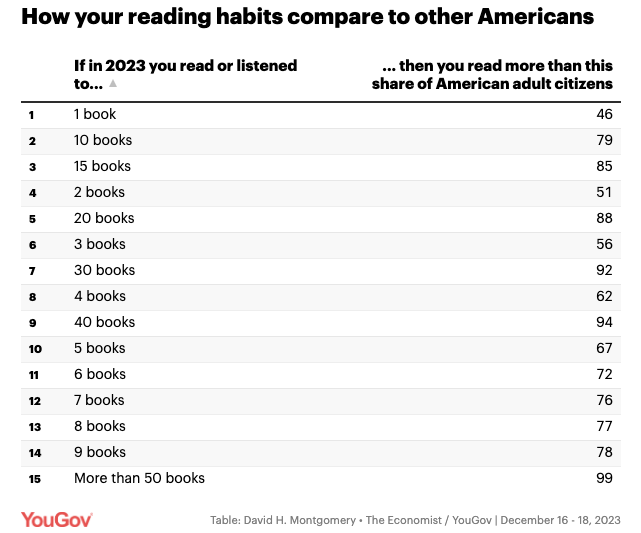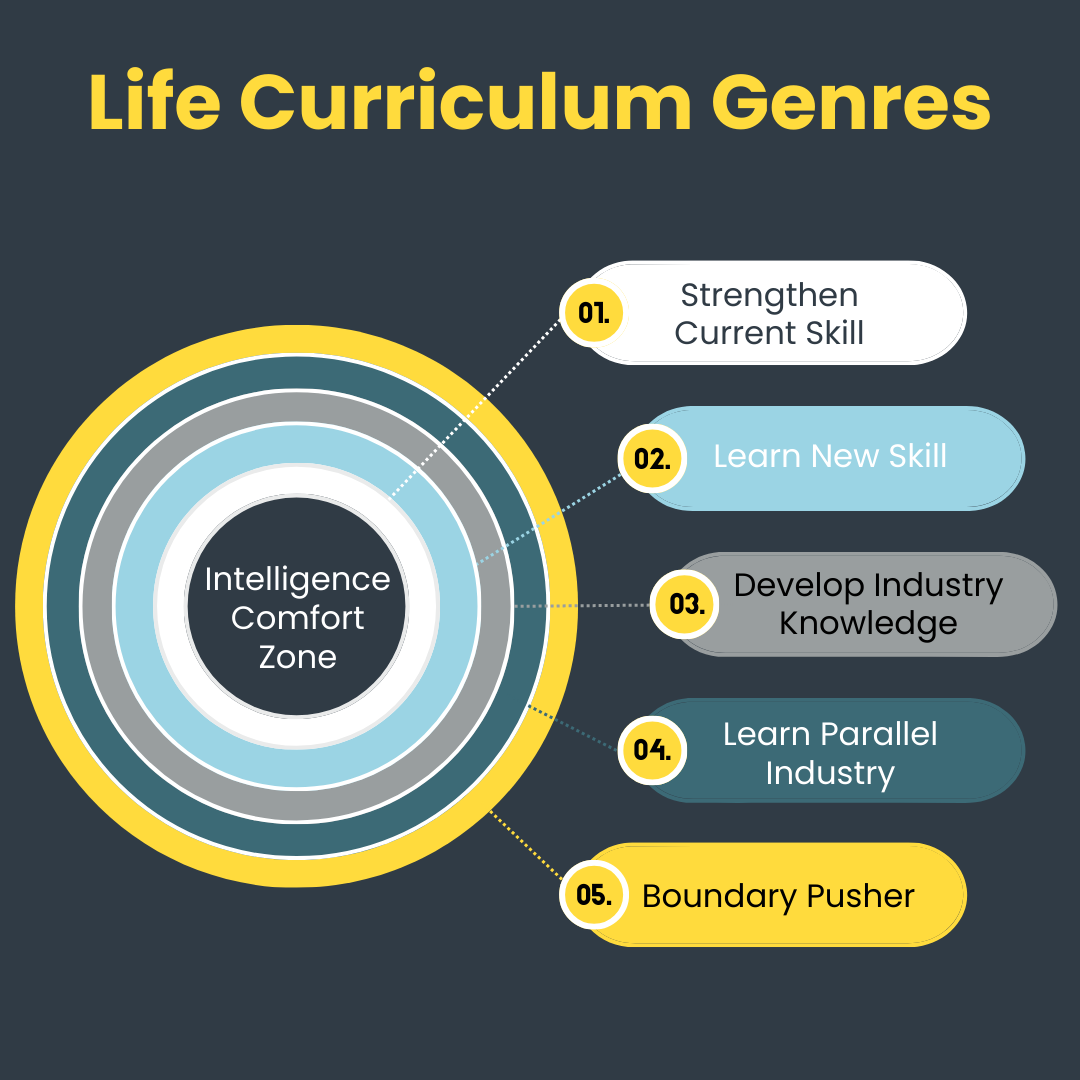The Life Curriculum: Build Your Personal Library for Growth and Success
(This is part of a series on Performance Well-being Habits).
Wellbeing Dimension - Mental
“85% of self-made millionaires read two or more [non-fiction] books per month.”
Maybe you don’t want to be a millionaire, and that’s fine (only 8.8% of the U.S. population are millionaires). But my guess is, you want to be more successful now than where you are…it’s human nature to strive.
But the challenge was face is that our current state is made up of all our previous experience and obtained knowledge. If we want to grow, we have to do more, and we have to know more. Hence, this month’s Performance Habit for Intellectual Wellbeing, Reading.
Why Read?
The list of benefits to reading is longer than you care to read (ironic, eh?), but some highlights:
Aids in sleep preparation
reduces stress
fights depression symptoms
contributes to longer life, and prevents cognitive decline as you age
Improved brain function
Enhances decision-making and emotional processing
Develops new skills
Strengthen problem solving skills
But with all these benefits, why are only 54% Americans reading? (and that’s only 1 book per year, fiction or non). Reasonings abound, one of my strongest opinions is that we spend 12-16 years of our lives being told what to read, often on subjects we care very little about. The result? We get burnt out, and think reading is meant for researchers, teachers, or brainiacs.
But consider the ramifications of not reading. Decreased cognitive decline. Slower processing speeds in your personal supercomputer (i.e. brain). And the scariest of all….you could already know everything you’ll ever know, because you’re “too busy” to learn something new.
Whether you feel you’re a “slow learner,” think you’re too busy, or just don’t know where to start, I propose a solution for your Next Better habit of improving your intellectual wellbeing: Your :”Life Curriculum” and “10 Pages a Day.”
Your Life Curriculum
No arguments here, it sucks reading books that don’t excite you. They’re tedious, boring, and you find yourself re-reading the same paragraph because you just resurfaced from a 10 minute scroll on social media. When we don’t understand WHY we are reading, it can be very hard to concentrate. I’ve personally suffered from this very ailment.
My treatment to purposeless reading is my Life Curriculum. Like a curriculum you might follow during your academic career, this Life Curriculum gives you guidance when selecting your next book to read. Since we can’t read every book written (another book likely got published since you started reading this), this process can help you overcome FOBO, and get down to learning.
When selecting a book, I have 5 main Genres I focus on (See graphic. Note: I focus on non-fiction, self-improvement books):
Strengthen Current Skill - These books help you further develop a skill you already have.
Learn New Skill - These books start developing a new skill, one still related to your field or industry.
Develop Industry Knowledge - Improve your awareness regarding your field or industry of expertise.
Learn Parallel Industry - Gain insight and understanding in a newer field, tangential to your current one.
Boundary Pusher - These books challenge your view of the world, and are completely disparate from your current knowledge base.
If you take a look at the graphic, you’ll notice that the as you move through the list of genres, they progressively venture away from your “Intelligence Comfort Zone.” Similar to increasing muscle size or building mental resiliency, you must subject yourself to challenging thoughts and viewpoints if you desire growth.
Optimizing Your Life Curriculum
To be sure your Life Curriculum is serving you to the fullest, follow these priniciples:
Start Easy - begin closer to your Intelligence Comfort Zone, working on a skill you already possess. While you don’t have to go in order from inside to outside, it can be easier to select a book that aligns with your interests this way, thus increasing the odds you’ll enjoy the book and keep reading.
Stay Balanced - While you can choose the genres in any order, be sure to reflect on your books every 6 months or so, and ask yourself “am I selecting a book from a variety of sources?” If not, start venturing out a bit.
No Repeat Genres - If you chose “Improve Industry Knowledge” this month, go with “Boundary Pusher” next month.
Progress to Success - As you choose topics from the outer circles (Boundary Pushers), these topics become more familiar, and thus they “progress” to the inner circle. This is a powerful view of adding to your own Intelligence Comfort Zone, as you can systematically progress from ignorance, to awareness, to competency, to mastery.
Don’t Overthink It - If it feels right, and you’re reading, go with it. Don’t spend too much time assessing what qualifies as a “new skill” versus a “current skill”, or what fits as a “parallel industry.” Just be sure it helps you develop yourself, raises your awareness about the industries you play in, and challenges you from time to time.
The Habit - 10 Pages a Day
Out of the 8 Dimensions of Wellness (Physical, Emotional, Spiritual, Intellectual, Financial, Social, Occupational, Environmental), the 4 internal dimensions (the first four in the list) require DAILY practices to maintain and improve. For your Intellectual Wellbeing, reading most every day is the goal (if you’re about to use “every day is unreasonable” as an excuse to throw up your hands and walk away….take a deep breath, relax, and realize perfection is not the objective, Better is).
So how do you reasonably read a book a month? The same way you climb a mountain, small steps at a time.
The goal is 10 pages a day. Not a book a month, not 1,000 books in your life, not 2 books per month to make a $1 million (that’s not how it works, btw).
The average length of a book is 200-300 pages. To read one book a month, you would need to read 10 pages a day. Seem reasonable? That’s because it is. And the power behind this habit is, once you start reading, and it’s a book you actually LIKE, you’ll probably read more.
Tips for getting in 10 pages a day:
Put the book where you’ll see it, be sitting down, and can grab it (think “where do I usually put the remote?”)
Start with 1 page a day instead of 10. Build the habit, flex the muscle
Don’t miss twice. If you miss a day, just make sure you don’t miss two days in a row.
Looking for More Habits for Performance?
Whether it’s reading, exercising, or meditating, you deserve the improvement you’re looking for. If you just need a bit of guidance, let’s chat.



